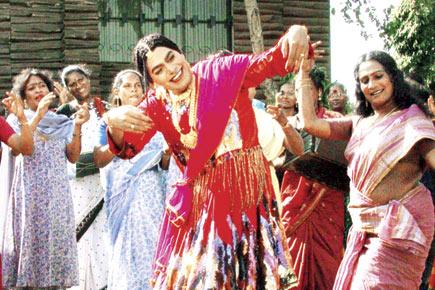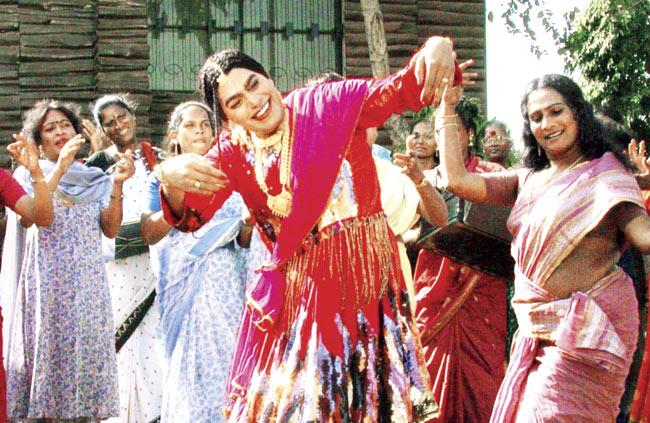Some years ago, Waman Kendre (now director of the National School of Drama) had directed a stunning stage production called Jaaneman, about the Hijada community

 Some years ago, Waman Kendre (now director of the National School of Drama) had directed a stunning stage production called Jaaneman, about the Hijada community.
Some years ago, Waman Kendre (now director of the National School of Drama) had directed a stunning stage production called Jaaneman, about the Hijada community.
As colourful as it was emotional wrenching, it was one of few plays that looked into the lives of eunuchs and transgenders with compassion.
ADVERTISEMENT
Kendre’s play was a perfect blend of design, music, performances and a never-seen-before story, which made it a landmark in Indian theatre.
He had earlier directed a play called Zulva about Devdasis, and touched upon the tragic lives of the Jogtas, who are men, forced by tradition to dress like women. (An Amol Palekar film, Daayra also had a Jogta as a lead character).

Ashutosh Rana played a eunuch politician in Shabnam Mausi, based on a real character. File pic
Mostly Hijadas are associated with the flamboyantly dressed beggars in trains and at signals, or those who land up at homes where there is a wedding or a birth to dance and demand baksheesh. They live in groups called akhadas and each group has a Guru. They have their own hierarchy and rituals (including the castration that they call nirvan) that they guard fiercely from outsiders.
People are a little afraid of them, and superstition has it that a Hijada’s blessing or curse is effective. Perhaps it is this fear or the discomfort of being around them that makes people quickly give the loudly clapping and chanting Hijadas the money they demand.
In our cinema, it is this singing-dancing Hijada that is most commonly portrayed (remember songs like Taiyab Ali Pyar Ka Dushman, Hai Hai from Amar Akbar Anthony or Saj Gyai Galli Meri Maa from Kunwara Baap).
Sometimes, the eunuch is a chilling villain, like Maharani in Sadak, played by Sadashiv Amrapurkar, or the scary cross dressing killer in Raaz 2 played by Prashant Nayaran; Aarif Zakaria played the eunuch son of an actress in Darmiyaan, Ashutosh Rana played a eunuch politician in Shabnam Mausi, based on a real character.
The best and most memorable eunuch was the one played by Paresh Rawal in Tamanna, who picks up a girl child discarded by her family and raises her. However, there is still a lot of ignorance about eunuchs and very few people know the difference between transgenders, homosexuals and hermaphrodites.
A play called Hijada was recently written and directed by Saggherr Loadhii and presented by the Human Rights Law Network (HRLN) a Delhi-based organisation. The organisation communicated that the platy “was launched in Mumbai view of the recent Supreme Court verdict on the recognition of the third gender as a sexual minority.
HRLN has been engaged in voicing concerns of LGBT in social, legal and political contexts. Hijada is a step towards bringing awareness and building alliances with people in struggle towards equal status for sexual minorities.”
The play is mainly about Kiran and Dimple, both confused about their sexual identity. Kiran is attracted to males, while Dimple feels he is a woman trapped in a man’s body. Kiran, whose manner is effeminate, belongs to a middle class Brahmin family, lives with his mother and goes to college, while Dimple is from a poor family. Both of them find that their society has trouble accepting them for what they are.
They meet and become friends. Dimple connects to a Hijada cult run by the Guru, Farida Begum, and Kiran also joins in. Both face pressure from their families, and have to choose between conformity and their alternative sexuality. The play raises questions, that it is meant to, about what it is to be a man or a woman, and how difficult it is to be the ‘third gender’.
The play is simple and direct, it does not reach the level of artistic excellence that Jaaneman did, but it tries to get its audiences to try and understand the other view and ask questions. A regular member of the audience might be drawn into the story of Kiran and Dimple, or be confused or even put off by them, but previous shows of the play have been seen and appreciated by eunuchs, who saw an accurate portrayal of their lives.
Over the last few years, in a spirit of openness and ‘coming out’ of closets, there have been plays about gays, but not much done with other sexual minorities, perhaps because playwrights and directors are unable to see beyond stereotypes of garishly dressed eunuchs with harsh voices and swaggering gaits.
For Loadhii’s play there was the inevitable battle with the censors, and protests from some members of the Hijada community. Still, the play was staged at several venues, went on to win awards at the State competitions and was invited to many theatre festivals. Audiences may come in out of curiosity, but stay back because there’s a powerful story being told.
At the beginning of the show, there is a cheeky announcement, telling people that they can get up and leave if they wish, but there would be no refunds. Can’t say if anyone actually left, the last show in Mumbai was free, so there was no question of a refund.
Deepa Gahlot is an award-winning film and theatre critic and an arts administrator. You can follow her on twitter @deepagahlot
 Subscribe today by clicking the link and stay updated with the latest news!" Click here!
Subscribe today by clicking the link and stay updated with the latest news!" Click here!







